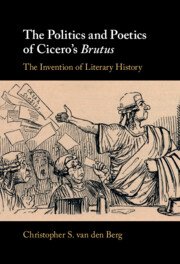This book began as one chapter of a project on the Greco-Roman literature of literary criticism, history, and theory. Early on it became clear, largely at the prompting of others, that more space was needed to give the Brutus its due. David Quint, and then Pramit Chaudhuri and Ayelet Haimson Lushkov, dispelled my initial reluctance to devote so much time to Cicero.
Several other scholars and institutions assisted immeasurably along the way. Sander Goldberg, Chris Kraus, Irene Peirano, and James Uden read early drafts of an article that appeared in Classical Philology, “The Invention of Literary History in Cicero’s Brutus” (© 2019 by The University of Chicago). That article, with several revisions and corrections, forms the basis for Chapters 5 and 6. I thank Classical Philology for permission to reuse the material.
Audiences at the 2015 meeting of the International Society for the History of Rhetoric, and at the annual meetings of the Society for Classical Studies in 2016, 2018, and 2019 provided stimulating feedback. Some of the earliest work was presented at the 2014 “Cargo Culture” conference at Stanford, some of the latest at “Historiography Jam III,” 2019, also at Stanford. In addition, audiences at the American Academy in Rome, Boston University, Bucknell, Smith, Tulane, University of California at Los Angeles, University of Illinois at Urbana-Champaign, University of Kansas, and Yale offered stimulating responses to several aspects of the project.
At various stages the manuscript, in part or whole, was improved immensely by the astute comments of Mont Allen, Yelena Baraz, Bettina Bergmann, Tom Frazel, Sander Goldberg, Charles Guérin, Joanna Kenty, Larry Kim, Bryant Kirkland, Christopher Krebs, Stephanie Pearson, Bethany Schneider, Kate Thomas, Chris Trinacty, and Chris Whitton. I have also benefited from discussions with Andrea Balbo, Susanna Braund, Corey Brennan, Tom Carpenter, Tony Corbeill, Nicola Courtright, Scott DiGiulio, Jackie Elliott, Joe Farrell, Andrew Feldherr, Kirk Freudenburg, Karissa Haugeberg, Maria Heim, Elizabeth Heintges, Steve Johnstone, Lynne Lancaster, Courtney Luckhardt, Evan MacCarthy, Duncan MacRae, Melissa Mueller, Ingrid Nelson, Nigel Nicholson, Matthew Roller, Jeremy Simmons, Friedrich Spoth, Michael Squire, Henriette van der Blom, Ann Vasaly, Chris Waldo, and Jarrett Welsh.
I am grateful to Katarzyna (Kasia) Jazdzewska for sharing chapters of her forthcoming book on Greek dialogue, and to Peter White and Jim Zetzel for sharing unpublished work on the tirocinium fori and on de Legibus, respectively. Adam Gitner at the Thesaurus Linguae Latinae assisted with queries concerning the material on rectus/recte. Julia Scarborough was an insightful Latin reading partner for Cicero’s Letters to Atticus. Chris Hallett generously responded to queries about the Roman heroic (nude) costume. Katharina Volk valuably commented on a draft and shared with me her forthcoming study of Roman intellectuals in the late republic. A manuscript exchange with Bob Kaster allowed me to profit from his excellent new translation with notes. His comments improved this book immeasurably and made me thoroughly rethink Caesar’s role in the Brutus. Jim Zetzel read the final draft, offering several crucial suggestions and saving me from several errors.
Michael Sharp supported the project early on and secured two readers who suggested several improvements. I wholeheartedly thank them and the editorial and production staff at Cambridge University Press. Amelia Wrigley, a Gregory S. Call Academic Intern at Amherst College, assisted with the first full rewrite. Pam Scholefield deserves thanks for judicious indexing. Mary Bellino provided editorial guidance, improvements, and corrections that were well beyond anything I could have ever expected.
The suggestions and improvements of scholars and friends are evident, to me at least, on nearly every page. If there are still passages in which the detail is tedious, the error unfixed, the argument muddled, or the speculation wild, the blame cannot be theirs.
Librarians seldom get the credit they deserve, and this book could not have been written without the assistance and resources of the libraries at Amherst College and Tulane University. Steve Heim (Amherst) and Hayden Battle (Tulane) were essential at several points. I’m also grateful to Sebastian Hierl and Paolo Imperatori (American Academy in Rome). The ongoing COVID-19 pandemic made it painfully clear how valuable such resources and their gatekeepers are. Even with widespread electronic resources, double-checking references and tracking down bibliography without physical access to a library has been challenging, to say the least. I completed final revisions to the manuscript as Italy began to face COVID-19 and the United States began to turn its back on the pandemic’s reality. My cohort of fellows at the American Academy in Rome were suddenly uprooted while struggling to finish projects to which we had devoted months if not years. I am thankful to each of them for intellectual encouragement and, above all, for friendship and compassion, virtues that may, one sometimes forgets, not only exist but even flourish in academic and artistic institutions. This book, or at least the completion of it, is in so many ways theirs.
This is not to overlook nearer examples. Katie Edwards provided patience, support, and encouragement well beyond what should be expected of anyone. Several pages of this book, including this one, have been written while holed up in an apartment across the street from the house of my sister’s family in Galveston, Texas. Here I typically write in the mornings and help out in the afternoons with household tasks and childcare while my sister, Patricia, faces a harrowing and protracted battle with cancer. The subject of this book is, from a certain perspective, how an individual might respond not to unexpected disaster, but to the slow and hopeful expectation that it will never fully arrive. I am impressed daily by my sister’s courage, by the love of her wife, Toni Ricigliano, and by the boundless and sometimes devilish joy of their son, my nephew, Willem. This book is dedicated to them.
